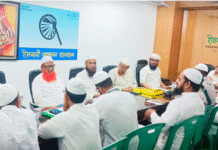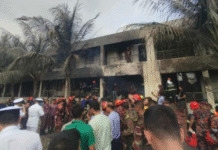
Attorney General Mahbubey Alam has demanded that the death penalty awarded to war criminal Salauddin Quader Chowdhury be upheld for his crimes against humanity perpetrated during the Liberation War in 1971.
He made the plea before a four-member Appellate Division bench after closing the law-point arguments of the prosecution on Wednesday.
“We’ve placed before the Appellate Division the evidence of the massacre Salauddin Quader Chowdhury unleashed in Chittagong during the Liberation War in 1971 in cooperation with the Pakistani occupation forces and his own forces,” the Attorney General told reporters after placing the arguments.
He said they told the apex court that the International Crimes Tribunal-1 awarded death sentence to the BNP leader on four charges although he deserved the capital punishment on seven charges. “We’ve demanded that the capital punishment be upheld for him,” he said.
On Tuesday, the prosecution started placing the arguments before the four-member Appellate Division bench, headed by Chief Justice Surendra Kumar Sinha, on the appeal filed by condemned convict Salauddin Quader Chowdhury challenging the death penalty handed down to him for his war crimes.
The other judges of the bench are Justice Najmun Ara Sultana, Justice Syed Mahmud Hossain and Justice Hasan Foez Siddique.
Meanwhile, the defence will start placing their arguments on Sunday (July 5). Advocate SM Shahjahan stood for the BNP leader.
On October 1, 2013, the International Crimes Tribunal-1 found Salauddin Quader Chowdhury guilty of crimes against humanity during the War of Liberation and condemned him to death.
On October 29 of the same year, he filed an appeal with the Appellate Division of the Supreme Court against the ICT verdict.
The tribunal indicted Salauddin Quader for his involvement in crimes against humanity on 23 counts under different provisions of section 3 (2) of the International Crimes (Tribunals) Act 1973.
It found Salauddin Quader, the son of Pakistan Convention Muslim League president Fazlul Quader Chowdhury, guilty of the crimes of genocide at Rauzan and murder of minority Hindu community members, including Nutan Chandra Singh, the founder of Kundeshwari Owsadhalay of Gohira, Awami League leaders and supporters of Bangladesh’s war of independence.
The tribunal also found him guilty of the charge of torture on the accused carried out on captives at his ancestral house ‘Good Hills’ in the port city of Chittagong during the 1971 Liberation War.
Source: UNB









